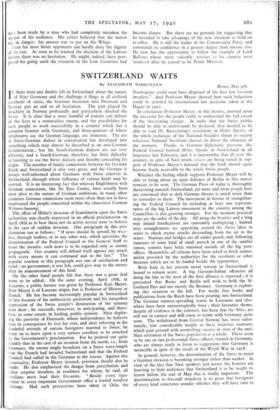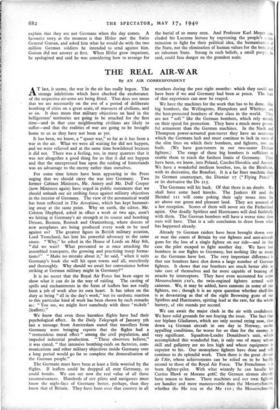SWITZERLAND WAITS
By ELIZABETH WISKEMANN
IF there were any doubts left in Switzerland about the nature of Nazi Germany and the challenge it flings at all civilised standards of value, the German incursion into Denmark and Norway put an end to all hesitation. The part played by treachery in Norway profoundly and particularly shocked the Swiss. It is clear that a mere handful of traitors can deliver all the keys to a remorseless enemy, and the possibilities for such people to work successfully in a country which has a common frontier with Germany, and three-quarters of whose inhabitants use the German language, are immense. The use of Swiss-German dialect in conversation has developed into something which may almost be described as an anti-German demonstration ; but the South-German dialects are not very different, and a South-German, therefore, has little difficulty in learning to use the Swiss dialects and thereby concealing his origin. The number of family connexions between the German Reich and Switzerland is also very great, and the Gestapo is always well-informed about Germans with Swiss relatives in Switzerland, through whom influence of various kinds may be exerted. It is an interesting fact that whereas Englishmen with German connexions, like Sir Eyre Crowe, have usually been most alive to the nature of German ambitions, in many other countries German connexions seem more often than not to have imprisoned the people concerned within the chauvinist German Weltanschauung.
The effect of Hitler's invasion of Scandinavia Lpon the Swiss authorities was clearly expressed in an official proclamation on April ath as to how those not on active service were to behave in the case of sudden invasion. One paragraph in this pro- clamation ran as follows: "If news should be spread, by wiee- less, through leaflets, or in any other way, which questions the determination of the Federal Council or the General Staff to resist the invader, such news is to be regarded only as enemy propaganda. Our country will defend itself against any attack with every means it can command and to the last." The popular reaction to this paragraph was one of satisfaction and relief ; no government, it was felt, could give way to the enemy after an announcement of this kind.
On the other hand people felt that there was a great deal more to be added. On the same evening, April 18th, at Lucerne, a public lecture was given by Professor Karl Meyer. Herr Meyer is of Lucerne origin, but is Professor of History at Zurich. He has become increasingly popular in Switzerland of late because of his enthusiastic patriotism and his outspoken expression of the Swiss people's detestation of the tyranny next door ; he succeeds, moreover, in anticipating, and there- fore, to some extent, in leading, public opinion. After deplor- ing the passivity of Denmark, whose independence he believes may in consequence be lost for ever, and after referring to the doubtful attitude of certain foreigners married to Swiss, he went on to insist upon a very serious corollary to be attached to the Government's proclamation. For he pointed out quite frankly that in the case of an invasion from the north, i.e., from Germany, the enemy might broadcast on a Swiss wave-length that the French had invaded Switzerland and that the Federal Council had called in the Germans to the rescue. Against this eventuality, Professor Meyer insisted, provision should also be made. He also emphasised the danger from parachutists and other surprise invaders, in readiness for whom, he said, all civilians must load their fire-arms. "Beside every type- writer in every important Government office a loaded revolver helongs. Had such precautions been taken in Oslo, the Berne, May 9th. Norwegians could soon have disposed of the first few German mvaders." Zind Professor Meyer showed how such behaviour could be justified by international law decisions taken at the Hague in 1907.
In conclusion Professor Meyer, in this lecture, insisted upon the necessity for the people really to understand the full extent of the threatening danger. In order that the Swiss public should be able to understand, he declared, they needed to be able to read Dr. Rauschning's revelation, in Hitler Speaks, of the whole technique of the National Socialist threat to society wherever National Socialism chooses to direct the offensive of the moment. Thanks to German diplomatic pressure the Federal Council banned Hitler Speaks in Switzerland in all languages last February, and it is noteworthy that all over the country, in spite of Nazi wrath, voices are being raised in sup- port of Professor Meyer's demand that the book should again become freely accessible to the whole Swiss people.
Whether the feeling which supports Professor Meyer will be able to bring about an open defiance of Berlin in this matter remains to be seen. The German Press of today is thoroughly threatening towards Switzerland, yet more and more people here are convinced that to defy German threats is much wiser than to surrender to them. The movement in favour of strengthen- ing the Federal Council by including at least one represen- tative of the big Labour movement in the country among the Councillors is also growing stronger. For the moment practical steps are the order of the day. All along the frontier and a long way inland fortifications are constantly multiplying ; barbed wire entanglements are appearing around the Swiss lakes in order to check enemy attacks descending from the air to the water. Stations and bridges are all under guard, and, following rumours of some kind of small putsch in one of the smaller towns, sentries have been stationed outside all the big post- offices. Meanwhile, all citizens have been asked to fetch ammu- nition provided by the authorities for the revolvers or other firearms which are to lie loaded beside the typewriters.
With Italy in her present mood tension in Switzerland is bound to remain acute. A big aerman-Italian offensive all along the line to the west of the Axis alliance is expected ; it is presumed that Rome and Berlin will wish to hold the St. Gothard Pass and not merely the Brenner. Germany is exploit- ing this situation to the full. For weeks free books and publications from the Reich have been pouring into Switzerland. The German rumour-spreading teams in Lausanne and else- where have been uninterruptedly busy ; their favourite theme, despite all evidence to the contrary, has been that the Allies are still not in earnest and will come to terms with Germany quite soon. The withdrawal from Central Norway has, most unfor- tuately, lent considerable weight to these injurious rumours, which gain ground with astonishing success in view of the anti- Nazi sentiment of the Swiss population as a whole. There seem to be one or two professional Swiss officers trained in Germany, who are always ready to listen to suggestions that Germany is invincible in spite of the result of the World War in 1918.
In general, however, the determination of the Swiss to resist a German invasion is becoming stronger rather than weaker. In view of the fact that Nazi speakers just across the frontier are boasting to their audiences that Switzerland is to be taught its lesson before the end of May this is vitally important. The determination to forestall treachery is so great that foreigners of every kind sometimes wonder whether they will have time to explain that they are not Germans when the day comes. A favourite story at the moment is that Hitler met the Swiss General Guisan, and asked him what he would do with the two million German soldiers he intended to send against him. Guisan did not answer at first. When Hitler grew impatient, he apologised and said he was considering how to arrange for the burial of so many men. And Professor Karl Meyer :oz. eluded his Lucerne lecture by expressing the people's ter.. mination to fight for their political idea, the humanisatit-, of the State, not the elimination of human values for the ben. :1 of an inhuman State. Strong in such beliefs, a small peop; he said, could face danger on the grandest scale.



































 Previous page
Previous page